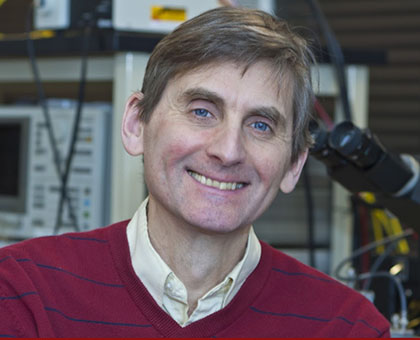Award given annually to an EDS member of the IEEE in recognition of innovations in electrical engineering education

Jesús del Alamo, the Donner Professor, MacVicar Faculty Fellow and Professor of Electrical Engineering in the Department of Electrical Engineering and Computer Science at MIT
Jesús del Alamo is the recipient of the 2012 Electron Devices Society (EDS) Education Award. This is given annually to an EDS member of the IEEE (International Electrical and Electronics Engineers) in recognition of innovations in electrical engineering education. On receiving this award at the IEEE International Electron Devices Meeting in San Francisco on Dec. 10, 2012, Prof. del Alamo was cited by the EDS "for pioneering contributions to the development of online laboratories for microelectronics education on a worldwide scale."Prof. del Alamo is the founder and principal investigator of the iLab Project at MIT and continues to investigate the technology and pedagogy of online laboratories ("iLabs") for science and engineering education on a global scale. iLabs are real experimental facilities that can be accessed through the Internet from a web browser.
Since 1998, under Prof. del Alamo's leadership, this project has developed several laboratory set ups for electrical engineering education that have been used by thousands of students from around the world to carry out a variety of microelectronics device and circuit characterization assignments. The iLab project has also created the MIT iLab Architecture, an open-source toolkit of reusable modules and a set of standardized protocols to facilitate the rapid deployment and effective management of iLabs in remote (and near) locations.
In starting the iLab Project at MIT in 1998, Prof. del Alamo sought to provide an educationally meaningful device and circuit characterization experience for MIT students taking his large microelectronics classes. The initial lab was demonstrated during class to remotely access a semiconductor parameter analyzer through a web browser. Students were soon able to perform this kind of work from their dorms. To date the microelectronics iLab has been used by over 3000 MIT students.
In the following years, Prof. del Alamo's team created other iLabs to study the operation of diodes, transistors and a variety of circuits in DC, the time domain and the frequency domain. With no time- or place- constraints the learning outcomes improved and the idea of developing global scalability was explored in collaboration with NUS and NTU in Singapore in 2000. With continued adaptation, the MIT Microelectronics iLab has now been used for free for credit bearing assignments by over 4,000 non-MIT students from 12 countries in 4 continents. Well over 100,000 experiments have been performed in this lab since its inception 14 years ago.
The iLab-Africa project, launched in 2004, is Prof. del Alamo's flagship international initiative. Using a new scalable software framework called the iLab Shared Architecture, Prof. del Alamo led the development and deployment of online laboratories optimized for operation in developing countries. To date, this effort has enabled 1000 African students to use MIT's labs in engineering and physics classes and has resulted in the development of many local laboratories in a variety of disciplines. The experience of developing the iLab architecture to operate robustly through unstable power networks and Internet connections using limited bandwidth has also contributed to the growing application of this technology. Prof. del Alamo holds a telecommunications engineer degree from Polytechnic University of Madrid and Masters and PhD in electrical engineering from Stanford University. From 1985 to 1988 he was with NTT LSI Laboratories in Atsugi (Japan). He joined MIT in 1988.
As the Donner Professor in EECS since 2003, Prof. del Alamo teaches undergraduate and graduate-level courses in electronics and advanced semiconductor device physics. He has been recognized for his teaching at MIT with numerous awards including the Amar Bose Award for Excellence in Teaching (2002) and was named a MacVicar Faculty Fellow in 2002.
Prof. del Alamo's main line of research is the exploration of III-V compound semiconductors to enable a new generation of deeply scaled transistors with the goal of extending Moore's law. For his contributions in this area, in 2012 he was awarded the Intel Outstanding Researcher Award in Emerging Research Devices and the Semiconductor Research Corporation Technical Excellence Award. Prof. del Alamo is a Fellow of the IEEE.